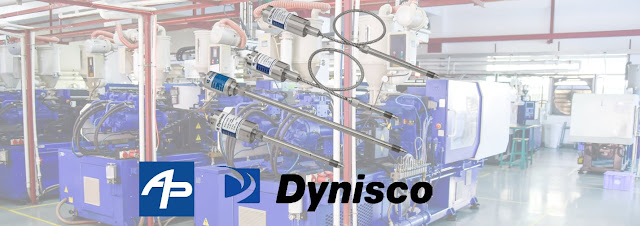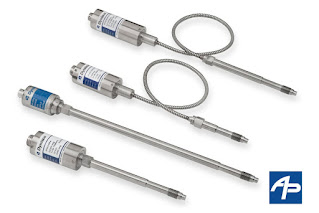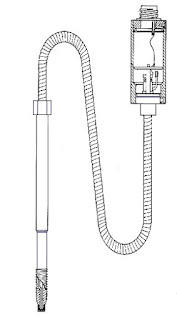- Introduction
- Unpacking and Examining the Pressure Sensor
- Selecting the Cable Assembly
- Unpacking and Wiring the Instrument
- Connecting the Sensor Cable Assembly to the Instrument
- Connecting the Cable Assembly to the Pressure Sensor
- Supplying Power and Setting Parameters on the Instrument
- Calibration of the Pressure Sensor with Instrumentation
A blog discussing sensors and instrumentation. New products, new technologies, and interesting applications. Types of sensors and instruments discussed include: Analyzers, Color Sensors, Displacement Sensors, Flow Sensors, Industrial Weighing, Instrumentation (Data Acquisition), Load Cells & Instrument Hardware. Machine Controls, Pressure Gauges, Pressure Sensors, Sanitary Sensors, Strain Gages, and Temperature Sensors. Courtesy of AP Corp.
Commissioning a Dynisco Pressure Sensor Using the Dynisco 1490 Panel Indicator
The Dynisco LMI5500 Series Melt Flow Indexer
https://a-pcorp.com
Part Cleaning Demonstration with the Dynisco PolyClean
This video demonstrated how to clean parts, in this case pressure sensors, using the PolyClean fluidized temperature bath.
Dynisco’s PolyClean is a fluidized temperature bath that will clean parts and tooling 2 to 3 times faster and safer than traditional cleaning methods, such as ovens. Dynisco’s fluidized bath system is air¬controlled with advanced PID temperature controller for optimal thermal performance. The system uses aluminum oxide sand (heated up to 1112°F) and air to surround the part or tooling. The “sand” will gently breakdown the polymer without damaging the part or tooling.
For more information about Dynisco in New England and Upstate New York contact AP Corp. Call (508) 351-6200 or visit https://a-pcorp.com.
Dynisco Polyclean Fluidized Baths
Cost-Effective, Fast, and Safe Way to Clean Various Plastic Processing Components
The Dynisco PolyClean Fluidized Temperature Baths come in three models and offer a cost-effective, fast, and safe way to clean various plastic processing components. PolyClean Fluidized Temperature Baths are applied in any polymer manufacturing or laboratory facility that needs minimal operator interaction and a low risk of harm to essential design requirements of a part during the cleaning process.
The PolyClean 6L Fluidized Temperature Bath is ideal for cleaning small tooling from laboratory extruders or injection molding machines.
The PolyClean 12L cleans extrusion tooling and other forms of hardware, forms parts, calibrates and tests various sensors and systems, heat treats metals and heats reactors, coils, flasks, and containers.
The 26L PolyClean has similar functions and benefits to the PolyClean 12L, but its 26" deep basket allows it to clean larger components than the PolyClean 12L
For more information in New England and Upstate New York, contact AP Corp by calling (508) 351-6200 or visiting https://a-pcorp.com.Dynisco Cloud Connect™
With the new Dynisco Cloud Connect™ through Microsoft® Azure – you get a single cloud solution that aggregates all your device(s) data into one place that is secure, reliable, easy to share, with 24/7 support.
The Dynisco Cloud Connect can be used for one product or entire global production lines –whether across the street or across the globe giving you easy access to manage data across the cloud, no matter where it lives. This solution is easily expandable and is even compatible with multiple brands and equipment types, from sensors to melt flow indexers to rheometers. With Dynisco Cloud Connect, you can compare and correlate data between facilities and be able to monitor and adjust parameters in real-time, from a mobile device anywhere in the world, whether working in the field, on the production floor, or in the office.
For more information about Dynisco products in New England and Upstate New York, contact AP Corp. Call them at (508) 351-6200 or visit their website at https://a-pcorp.com.
Which Melt Pressure Sensor Is Good for My Application?
So how do I choose the right melt pressure sensor for my application?
A sensor is defined through the following specifications:
- Pressure Range
- Process connection
- Electrical output and connection
- Capillary configuration (rigid/flexible)
There are more variables come into play, but let's focus on these four since they are the most critical.
Melt Pressure Sensor Pressure Range
Melt Pressure Sensor Process Connection
Melt Pressure Sensor Electrical Output
A pressure sensor is an electro-mechanical device that converts a mechanical effect (pressure deflects a thin piece of metal) into an electrical signal through a strain gauge. The strain gauge changes its resistance by following the deflection of the metal piece. In the simplest case, the strain gauge signal can be used directly to feed a read-out device to display the pressure. In order to accommodate industry-standard equipment, such as process control equipment, manufacturers like Dynisco supplies sensors with different amplified output options such as 4-20mA or 0-10V.
Melt Pressure Sensor Capillary Configuration
A typical pressure sensor has a liquid-filled capillary that connects the process-connection diaphragm (which is deflected by the process pressure) and the measuring diaphragm (where the strain gauge is bonded). This capillary is necessary to create a heat barrier, as the strain gauge cannot withstand the typical process temperatures at plastics processing. Also, the sensor's electronics need to be kept away from heat sources as well as possible. To find a suitable mounting location for the electronics, countless combinations of the rigid stem and flexible connection lengths are available.
Other Considerations in choosing a Melt Pressure Sensor:
- Diaphragm materials
- Diaphragm coatings
- Approvals and certifications
Polymer Analysis Using ASTM/ISO Method A Testing and the Dynisco LMI5500 Melt Flow Indexer
The LMI5500 Series Melt Flow Indexer from Dynisco
The LMI5500 provides a new level of simplicity of use with its simple to clean inspection plate, accessibility for sample cutting, and improved touchscreen display.
Most notable is its own gravitational correction characteristic that takes into consideration gravity according to the units geographic location.
It is capable of delivering a wide range of data for melt flow rate, shear stress, shear rate, apparent viscosity, intrinsic viscosity, melt density, and testing conditions.
FEATURES OF THE DYNISCO LMI5500 SERIES MELT FLOW INDEXER
- Gravitational correction
- New Windows 10 IoT touch screen native interface
- Built in WIFI and ethernet
- HDMI and multiple USB ports
- Direct digital scale USB interface for sample weighing
- Performance meets international standards: ASTM D1238 & D3364, ISO 1133-1, BS2782, DIN 53735, JIS K7210
- Automatic sample cutter for ease and consistency in sample cutting
- Melt Flow Rate to Intrinsic Viscosity correlation for PET
- Nearly unlimited program storage capability
- Increased access to the die for sample cutting with a strategically placed mirror to easily view the die and cutting area
- Supports multiple languages
For more information about the Dynisco LMI5500 Series Melt Flow Indexer in New England and Upstate New York, contact AP Corporation by calling (508) 351-6200 of visit their web site at https://a-pcorp.com.
Dynisco Online Viscosity Measurement
From the Dynisco presentation "From lab to production, providing a window into the process."
Get maximize extrusion efficiency with Dynisco Online Rheological Testing.
Dynisco online rheometers provide a "window into your process" with the ability to continuously measure critical parameters form melt flow ratio to intrinsic / relative / melt viscosity and from constant shear rate to shear sweep.
The video above introduces the Dynisco ViscoSensor, CMR IV, and FCR and presents the viewer a cost justification for their use. You can also download the presentation from the AP Corp. website here.
For more information in New England and Upstate New York, contact AP Corp. by calling (508) 351-6200 or by visiting https://a-pcorp.com.
Dynisco ViscoSensor for Online Rheological Measurement
 |
| Dynisco ViscoSensor for the thermoplastics resin industry. |
Designed for the thermoplastics resin market, the Dynisco ViscoSensor provides the continuous measurement of melt flow rate, or apparent or intrinsic viscosity, directly on the manufacturing process.
To learn more about online rheological measurement with the Dynisco ViscoSensor visit this page on the AP Corp website.
Andruss-Peskin (AP) Corporation
(508) 351-6200
https://a-pcorp.com






